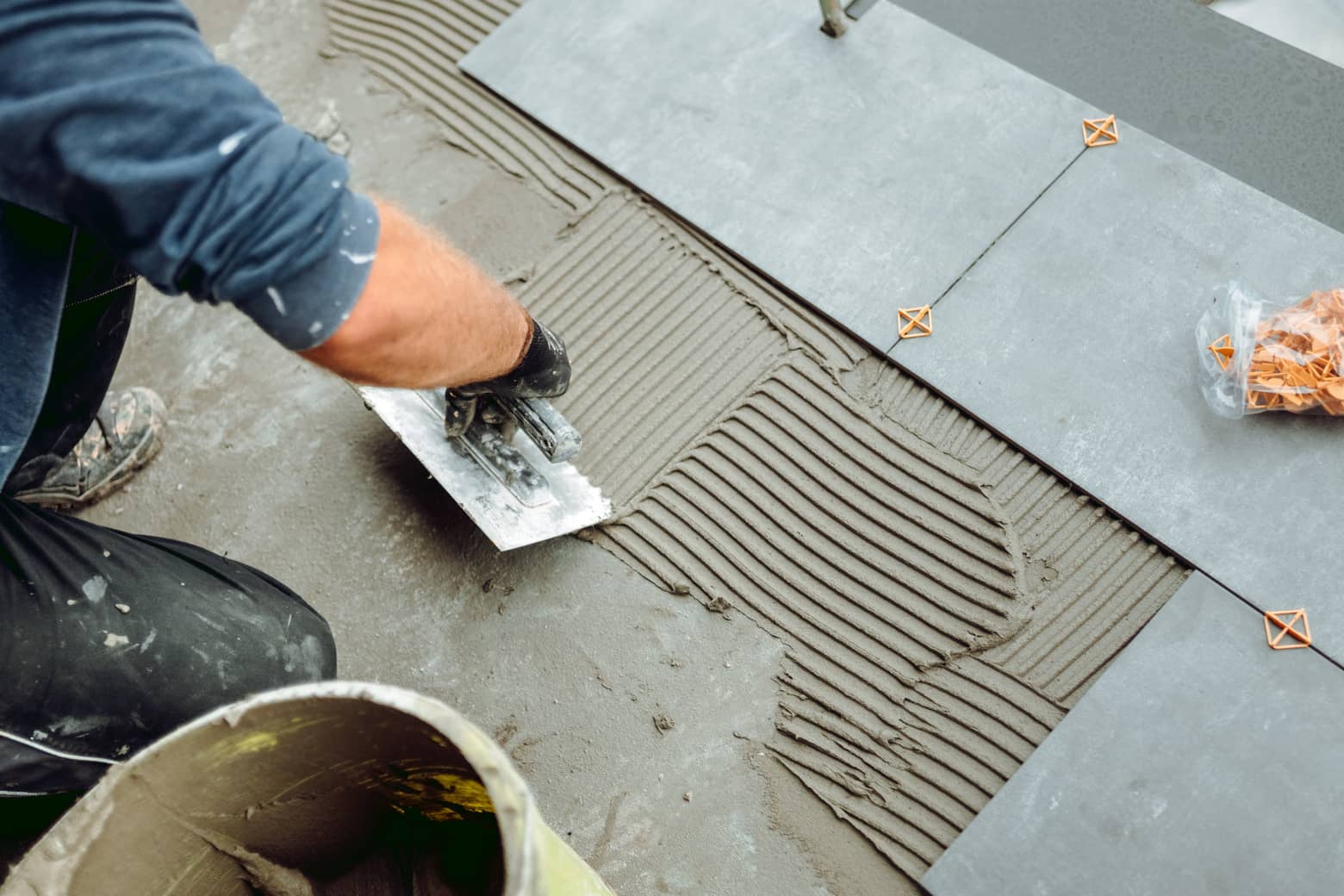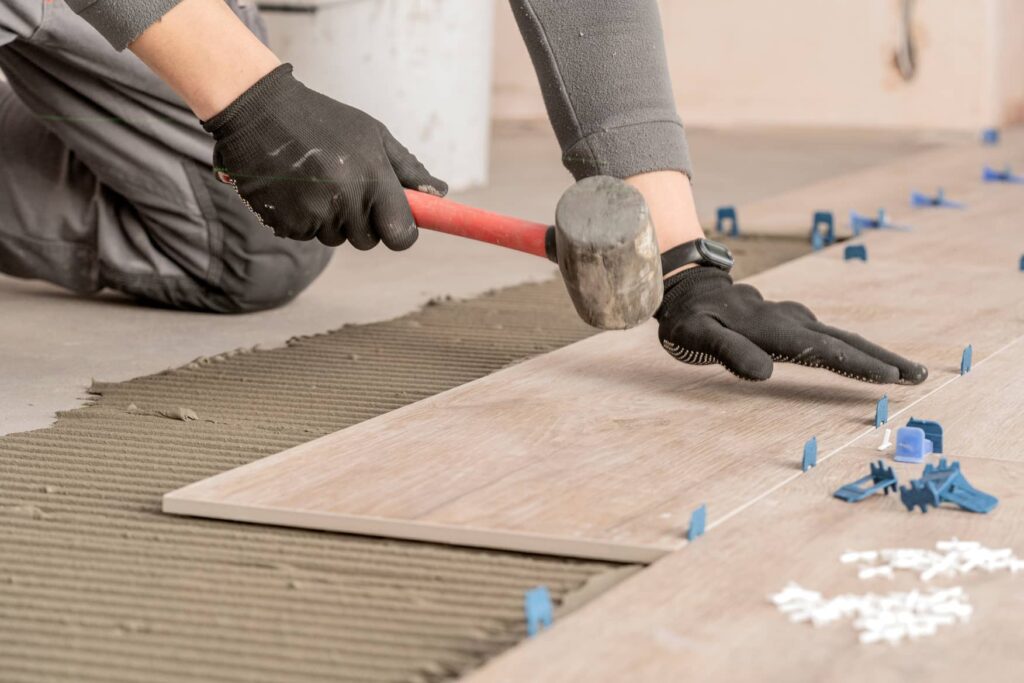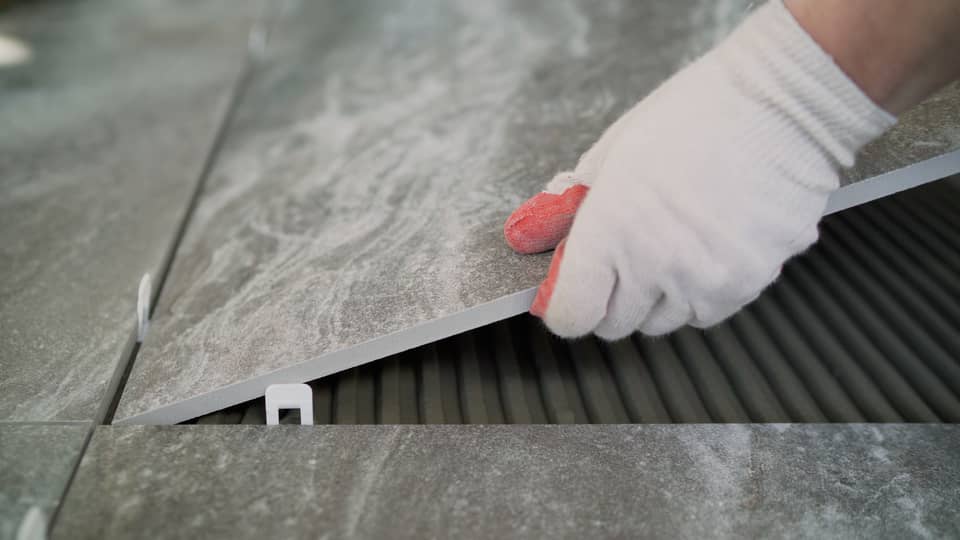
Owning a home can be an exciting time. Getting to update or upgrade various parts of the inside and outside of the home is great for a homeowner. Keep in mind, before starting any project you will want to read up on what is involved. In most cases, you will want to hire a professional who has experience completing the necessary project. For example, tiling your floors or walls could be a challenge. If you don’t know best practices, you might end up doing more damage and spending more money. Knowing how long the mortar takes to dry is a key component for tiling success. How long does tile mortar take to dry? The minimum dry time is 24-48 hours. However, it is recommended that you wait 72 hours.
Let’s take a look below at what else is involved with tile mortar.
What Is Mortar?
Mortar is a mixture created to bond heavy materials to each other. Also, it can be used for lighter materials like tile. It is made up of sand, water, lime, and cement. When mixing or applying your mortar use gloves to protect your skin. Additionally, mortar has a lower water content than grout. You will only use enough water to make the mortar smooth and buttery.
When you spread mortar, use a notched trowel to ensure a thin floor underlayer. Hours before walking on the tile, check the tile surface to make sure it has cured.

What Are The Types Of Mortar?
Believe it or not, there are a variety of mortar types. Be sure to store mortar at room temperature regardless of the tile project. Let’s take a look below at what the various types of mortar there are.
- Thinset – This type of mortar typically takes between 24 and 48 hours to cure. Thinset mortar is used with tile and countertops. It contains a water-retaining additive that escalates the curing and hydration process. Be sure to read up on what the tile’s cure strength is before using thin-set mortar.
- Brick mortar – This type of mortar is meant for heavy-duty materials and uses Portland cement. Also, it can take 28 days before it is fully cured. There are 5 types of brick mortar with varying cure times. Let’s take a look at each.
Type M
This type is used on retaining walls and lateral loads. It supports projects dealing with extreme gravity situations and has a cure strength of 2,500 psi.
Type S
This type is used on paving, patios, and exterior walls. It contains a cure strength of 1,800 psi.
Type N
This type is used for reinforced interior walls and other masonry needs like floor tiles. It has a cure strength of 750 psi.
Type O
This type is used for exterior repairs, soft masonry needs, and non-load-bearing interior needs. It has a cure strength of 350 psi.
Type K
This type is not for any load-bearing jobs or structural repairs. It is most often used for historical preservation. It has a cure strength of 75 psi.
What Can Determine The Drying Time?
Keep in mind that there are factors that can determine the drying process of your tile mortar. Let’s take a look at the list of what can speed up or delay your tile mortar dry time.
- Temperature – Typically, temperatures for normal cure and dry times range from 40 degrees Fahrenheit to 100 degrees Fahrenheit. Consequently, the colder the temperatures, the slower the cure and dry time.
- Airflow – The curing process requires that your mortar stays hydrated. High winds or fans can suck out the moisture from the mortar and this will damage the cure strength of the mortar. If you are working outside, be sure to do it when the winds are not high. Read up on any re-hydration instructions that the mortar manufacturer provides.
- Water – Follow all manufacturer guidelines for mixing ratios of water to mortar mix. Also, failure to follow these rules can reduce your cure strength and change your cure time.
- Humidity – High humidity requires less moisture or water for maintaining your mortar’s cure time. Additionally, the lower the humidity the more moisture is needed to keep your cure time normal.
- Set or curing – Within 24 to 48 hours you will be able to begin applying the grout. Keep in mind, that the mortar below the tiles might not be cured just yet. Also, each cure strength and setting time will vary based on the project.
Other Recommended Maintenance
Now that you know about tile mortar drying, let’s take a look at some other areas of recommended maintenance. One of those is removing paint from tiles. Also, to do this, you will need to scrape, wipe, and rub to get the paint off and there is a list of steps available to follow.
Another area is tiling a shower. The amount of time it takes will depend on the size of the shower, as well as the installer, the size of the time, the grout type, and the grout sealer. It can be a big project and you will need to know if you have the right materials and professional assistance.
Lastly, gone are the days when homes have carpet in the restroom. Instead, many people like to have tile. You can tile a restroom and either remove the toilet or tile around it. There are steps on how to do both so you can choose what works better for you.

When Do I Call A Professional?
Using mortar in the home for tiling can be difficult if you are unsure how to use it properly. Additionally, there are a lot of directions to follow about humidity, setting, water, curing, and temperature that may be overwhelming. Contacting a professional is a good idea to make sure that the job is done right and that the mortar does what it is supposed to do. Also, if using it outside for bricks, you must use the right type as well. Consequently, look to hire a professional contractor that has experience with mortar. Additionally, reach out to your local home inspection team to do a full home inspection to make sure other areas of the home were installed correctly too.
Conclusion
Whether you are building a brick wall or installing tile to name a few, you want to make sure you have the right materials and can set the mortar so it holds like it should. It is a good idea to call on a local mason to do the job so you know it is done right. Avalon Home Inspections would be happy to come in and complete a full home inspection and recommend some great professional mason contractors. Avalon Home Inspectors can inspect your home in Atlanta, GA., and surrounding areas.






